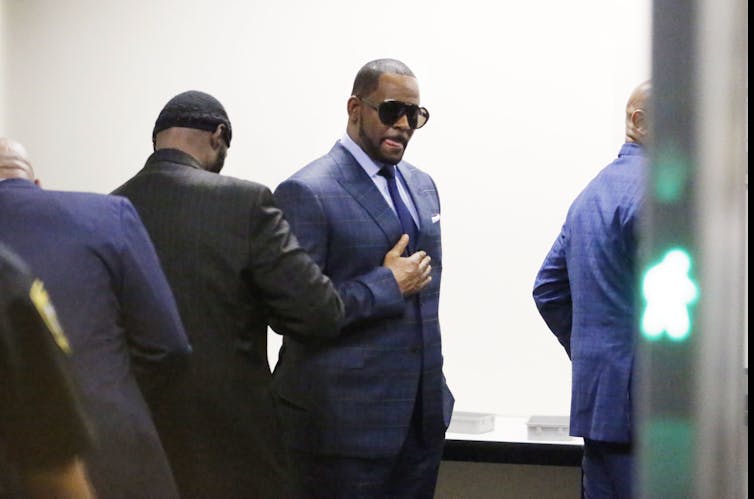News
» Go to news mainR. Kelly was aided by a network of complicity—common in workplace abuse—that enabled crimes to go on for decades
 A lengthy spell in prison awaits the convicted sexual predator.
A lengthy spell in prison awaits the convicted sexual predator.
��
is a professor of business at and is an associate professor of advertising and public relations at the .
R&B singer R. Kelly was on Sept 27, 2021, having been exposed as the ringleader of a decades-long scheme to recruit girls, boys and women to have sex with.
During the six-week long trial, jurors heard . Witnesses also revealed how members of the 54-year-old’s the singer’s crimes.
As researched unethical behavior for many years, we found the patterns revealed in Kelly’s trial to be classic examples of how unethical, even criminal, conduct can persist in organizations for long periods of time, often as an open secret and often supported by others.
Beyond the ‘bad apple’
Our and – from fraud to sexual harassment – have looked at sectors including business, journalism, health care, sports and government. We found that despite policies and laws designed to prevent it, such behavior is rife in many organizations.
While there is a tendency to focus on the “bad apple” – the perpetrator and their despicable behavior – in cases of unethical behavior, demonstrates the need to look beyond the individual to understand how and why unethical behavior thrives and persists.
Repeatedly, , such as Kelly, do not act alone. They tend to have active enablers – groups we call “networks of complicity” who support the abuse in various ways. They also have passive enablers – groups we label “networks of complacency” who turn a blind eye to what is happening.
In all workplaces, people are embedded in networks of social relationships that they value and want to maintain. However, we found that if someone falls prey to the charms of a predator – usually powerful men, such as Kelly – they gradually lose their perspective. Their desire to be “part of the team” comes to dominate other considerations, including norms of ethical behavior.
These enablers often do not intend to do bad things, but and biases can blind them to their own increasingly bad conduct. They are also subject to situational and organizational pressures, like conforming with others or trying to please powerful figures.
Running interference
In Kelly’s trial, the prosecution produced 45 witnesses who provided evidence of managers, assistants, bodyguards and other members of Kelly’s entourage who not only , but also covered for him and fixed problems for the singer when they occurred.
We have heard stories such as Kelly’s time and time again: A charismatic leader , but also to draw individuals from inside and outside their organization into a loyal network of supporters. The supporters .
The perpetrators control and shape information and build myths to enhance their expertise and greatness. Members of the network of complicity .
Our research – like the evidence in Kelly’s trial – demonstrates that bad behavior . The prosecution provided evidence that . For example, a former tour manager, Demetrius Smith, testified to get a fake ID for underage R&B Singer, Aaliyah, so that Kelly could marry her.
Typically, the bad behavior of the perpetrator and the network creates a in which abuse and unethical acts become the norm and everyone in the organization suffers, not just victims.
Our research also shows that typically many people beyond the network of complicity unwilling to report abuse or take action to stop it. They form a network of complacency that, through its passivity, also enables the perpetrator’s bad behavior to continue.
The prosecution in Kelly’s case provided evidence that Kelly was .
Lifting the veil on abuse
The question that many people will have is how could people in Kelly’s networks have allowed themselves to go along with such blatantly unethical – and now we know, criminal – activities for so long?
Our research shows that network members often suffer from “” – a condition in which ethical issues do not come clearly into focus at the time of the abuse – and “moral muteness” – in which people do not raise or talk about ethical issues even among other network members.
They can also be governed by self-interest bias. It was certainly in the self-interest of those surrounding Kelly to build his brand, contribute to his success, earn his favor and keep their jobs.
This self-interest bias can blur moral vision.
There is also a framing bias, in which events are portrayed and presented in a misleading light. In closing arguments, the as that of “a playboy” and that he was only engaged in “kinky sex,” which is “not a crime.”
If Kelly’s inner circle framed the star’s behavior in this way, it would seem less horrific and abusive to them, and could be rationalized or dismissed.
If persistent unethical behavior is to be stopped, convicting perpetrators alone is not enough. Our research suggests that networks of complicity also need to be addressed and the behavior of enablers exposed and where appropriate punished. Organizational leaders can learn to identify not just perpetrators but also their networks of complicity. Meanwhile, network members themselves need to be shown that it is in their self-interest to expose perpetrators, like Kelly, and
[Over 110,000 readers rely on The Conversation’s newsletter to understand the world. .]![]()
, Professor of Business, and , Associate Professor of Advertising and Public Relations,
This article is republished from under a Creative Commons license. Read the .
Recent News
- Two Bachelor of Commerce graduates on the importance of extra‑curricular activities and people skills
- Knowing her worth: Kayler Mutyabule
- Patrick Law: Pivoting cross‑country
- Building on passion: Francesca Hawkes
- Taking it further: Rebecca Osamudiame
- Isioma Oye‑Onwuka: A student profile
- Q&A with Dana Kabat‑Farr
- Himanshu Kumar: A student profile
